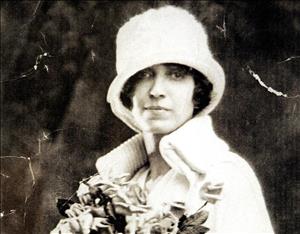On June 19, 1910, in Spokane, Washington, Father's Day is celebrated for the first time. Sonora Smart Dodd (1882-1978) becomes convinced that fathers deserve their own day of respect and recognition. She persuades the Spokane Ministerial Alliance and the local YMCA to observe this new "day." The ministers settle on a date of June 19, 1910, as the nation's first Father's Day, and they deliver sermons all around city about the importance and obligations of fatherhood. The story is picked up by wire services and the idea gains momentum in communities all around the country. By the 1920s, Father's Day will be commonly observed (though not officially recognized) throughout the country. In 1972, President Richard M. Nixon will make it a permanent national holiday.
Sonora's Loving Parent
Sonora Smart Dodd, a young Spokane mother, artist, and poet, conceived the idea in 1909 when she was sitting in Spokane’s Central Methodist Church listening to a Mother’s Day sermon extolling the virtues of mothers.
"I like everything you have said about motherhood,” she told the pastor after the service. "But somehow, 'father' seems something apart. Do you not think it would be fair and fine to give father a place in the sun?" ("Father's Day Wins Friends").
She had excellent reasons for being sensitive to the status of fathers. In 1898, while she was growing up on a dry-land ranch between Wilbur and Creston, her mother died. Sonora was only 16; she had five younger brothers.
Her father, William Jackson Smart (1842-1919), dedicated himself to rearing all six children. She said he was "a very strict man, a real disciplinarian," but also a "kind and loving parent who kept us together and happy" ("Mrs. Dodd"). She called him a "golden rule type of father" ("Father's Day Founder").
Giving Father's a Place in the Sun
So she drafted a petition declaring a certain Sunday in June as Father’s Day. Gaining support was not always easy; she later said it took a "certain degree of temerity" ("Father's Day Was Sent"). This was during an era when mothers were considered the child-raisers and fathers were considered aloof at best and derelict at worse. One of the popular songs of the time was titled, "Everybody Works But Father." Yet she later wrote that the "shackles of disrespect had worn themselves weak" (Dodd, "Whole Country").
"The time was expedient for the emancipation of father," wrote Dodd (Dodd, "Whole Country").
She finally convinced Mark H. Wheeler and George A. Forbes of the local YMCA to co-sign her petition. They went to the Spokane Ministerial Alliance and proposed that the first Father’s Day be celebrated on June 5, 1910, her father’s birthday (he was still alive), but the ministers needed more time to prepare their sermons. So the first written record of the Father’s Day concept comes in a Spokane Daily Chronicle front page story on June 6, 1910, noting that the Spokane Ministerial Alliance and YMCA had "enthusiastically" endorsed Mrs. Dodd’s proposition and agreed to declare Father’s Day on June 19 ("Plan Father's Day").
Preachers across the city delivered Father’s Day sermons. People wore roses to church in honor of their fathers. Children gave fathers small gifts. Local businesses took out newspaper ads with Father’s Day themes. Dodd spent part of the day delivering gifts to "shut-in fathers" of Spokane.
A Nation Pays Tribute
News stories -- written "either in the spirit of jest or earnest," in Dodd’s wry phrase -- streaked across the country by wire ("Father's Day Was Sent"). Before long, letters were pouring in from all over the country and the world. At the peak, she was receiving 100 letters a day, many from people who wanted to expand the celebration to their communities. Dodd recruited several other Spokane women to handle the correspondence.
Momentum built over the next decade as other cities began celebrating Father’s Day. Politicians, including William Jennings Bryan (1860-1925) and presidents Woodrow Wilson (1856-1924) and Calvin Coolidge (1872-1933) got behind the idea, at least informally. By 1925, Dodd wrote that the entire country was paying tribute to fatherhood.
Yet Father’s Day still didn’t enjoy formal national recognition. In 1938, the International Father’s Day Association, of which Dodd remained honorary president, said its No. 1 project was to win official congressional recognition of Father’s Day.
In 1966, President Lyndon B. Johnson (1908-1973) signed a proclamation declaring the third Sunday in June to be Father's Day. In 1970, the U.S. Congress passed a joint resolution making Father's Day a true national holiday. President Richard M. Nixon (1913-1994) signed a proclamation in 1972, making the designation permanent.
"I am happy that this could have come to pass in my lifetime," said Dodd at age 90 (National Father's Day Committee). She would live another six years, revered in Spokane as the venerable Mother of Father's Day.

